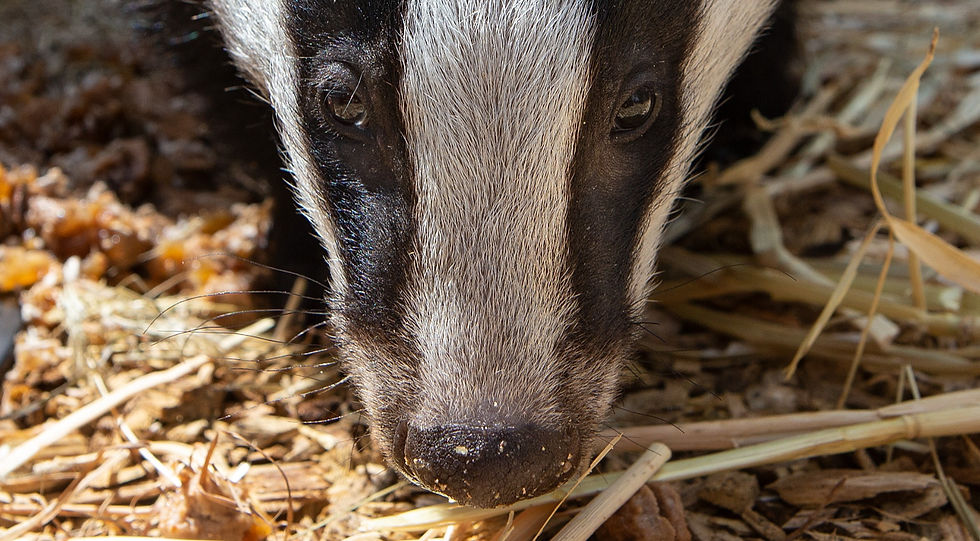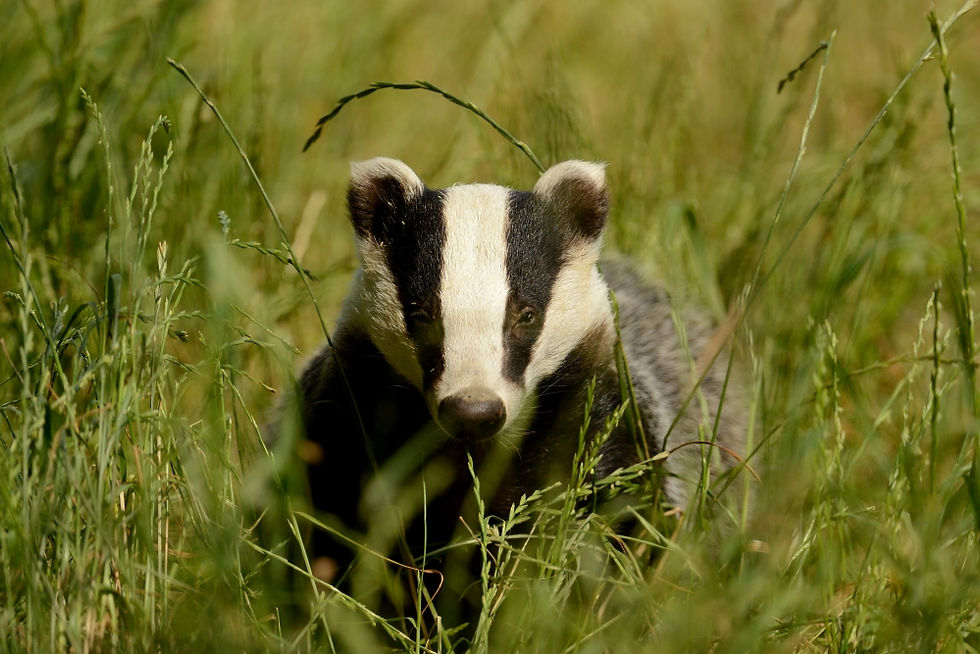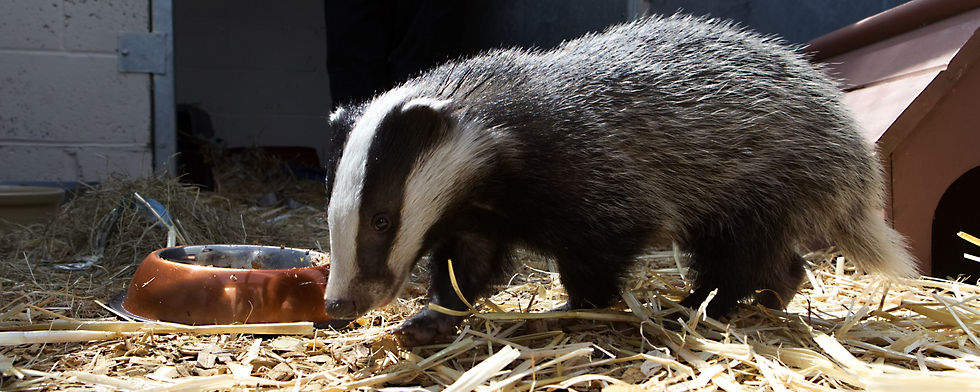Celebrate the Wonders of Badgers | One of Britain's Conflicted Mammals
- Admin
- Sep 18, 2023
- 4 min read
Updated: Sep 19, 2023

Every year, on a special day in October, nature enthusiasts and conservationists unite to celebrate Badger Day. This occasion serves as a reminder of the unique and often misunderstood role that badgers play in our ecosystems. It's a chance to shine a light on the essential work carried out by organisations and individuals dedicated to safeguarding these remarkable creatures.
The Plight of UK Badgers
European badgers, with their distinct black and white facial markings and stout bodies, have fascinated humans for generations. Whether they are portrayed as wise characters in folklore or charming personalities in children's stories such as Wind in the Willows, badgers hold a special place in our hearts. However, these elusive creatures are often shrouded in myths and misconceptions.
Badgers, one of over 100 mammals found in the UK, are exquisite creatures that have faced persecution and habitat loss for decades. Once primarily rural inhabitants, they have adapted to urban life as their natural habitats dwindle. The emergence of urban British badgers can be traced back to the mid-20th century when they began establishing their presence in cities. This era saw the construction of suburban areas with spacious gardens, creating an ideal habitat for badgers. Today, they can be found in many towns and cities.
However, these animals still face unjustified prejudice. Unfairly blamed for the decline in hedgehogs and face persecution from farmers or landowners for loss of cattle. Unlike foxes, badgers are legally protected in many European countries, but habitat destruction and harm from human activities remain significant threats to their survival. Badger Day serves as a reminder that badgers deserve our understanding and protection, not persecution. It's a day to recognise their vital role in our ecosystems and advocate for their conservation.

Dedicated Care of Badgers | Protected Species
There are many organisations who are dedicated to the care and conservation of badgers. One organisation at the forefront of badger conservation is the Badger Trust, headquartered in the UK. They are committed to the protection, welfare, and conservation of badgers. Thanks to the Badger Trust badgers are a protected species because of the excessive levels of cruelty they face. In 1992, the Protection of Badgers Act (PBA) gave badgers across the UK unrivalled protection. These shy nocturnal mammals mostly live in woods so are rarely spotted. Sadly, a deceased badger on the side of the road is likely the only time most people will ever see one of these magnificent mammals in the wild. Reasons for casualties include Road Traffic collisions, Illness or Disease, and Human Interactions such as habitat destruction or conflicts with pets.
One of the most common reasons for admission at Brent Lodge Wildlife Hospital, a rehabilitation hospital in West Sussex, is when badger cubs are orphaned or abandoned due to loss of parents. Cubs are born pink and within days they develop their recognisable black and white markings. On arrival cubs go through an assessment and a treatment plan is decided. Babies will initially be hand fed but as their infamous sharp powerful claws start to develop, they will be encouraged to become self-sufficient.
At this stage they may then be moved to an outside enclosure. Badgers are highly social animals, so wherever possible we place them in groups to develop social skills. Wild badgers live underground in a network of tunnels. Known for digging our rehab enclosures are purpose built so animals cannot dig out.
One innovative approach used in badger rehabilitation is the creation of enrichment enclosures. These enclosures provide a secure and stimulating environment for recovering badgers, ensuring they regain their natural instincts and skills before being released into the natural habitats. In these enclosures, badgers can practice essential behaviours such as foraging, digging, and scent marking, preparing them for a successful return to the wild. The important skills they learn in our temporary care will go onto to determine their long-term survival once released. Another critical aspect of badger care involves preventing orphaned cubs from becoming too accustomed to human presence. Overexposure to humans can lead to habituation, which could result in badgers venturing closer to human settlements, potentially causing conflicts. To prevent this, animal care experts handle, feed, and interact with badgers with great care to minimise human imprinting.

Partnering for a Badger-Friendly Future
Here are two fantastic ways you can support badgers and the work at Brent Lodge as we continue to care for badgers.
Protect and Respect Badgers
Badgers are iconic mammals, and we are lucky to have them around in this country. Small changes in perspective and simple actions go a long way towards sustainable and friendly human-badger co-existence. Badger Trust’s ‘Living with Badgers’ guide is for anyone interested in badger-human co-existence, including those of us who may currently be experiencing unwelcomed encounters with badgers.
Badger Socks
Bare Kind Bamboo Socks, a company committed to sustainability and wildlife conservation, has joined forces with Brent Lodge to raise awareness about badgers. Bare Kind offers a unique line of fox-themed socks, not only stylish but also comfortable, thanks to their eco-friendly bamboo material. What sets these socks apart is their mission: Bare Kind donates 10% of the proceeds from their badger socks to Brent Lodge Wildlife Hospital.
Let's Give Badgers a Better Future
Badger Day is a time to celebrate these enigmatic creatures, learn more about their significance in our ecosystems, and support organisations like the Badger Trust and Brent Lodge Wildlife Hospital in their dedicated efforts to protect and rehabilitate badgers across Britain. By raising awareness, dispelling myths, and partnering with like-minded businesses, we can secure a brighter future for badgers and the delicate balance of our natural world. Mark your calendars for the next Badger Day in October, and let's make every day a badger-friendly day.
By Asha Park







Comments